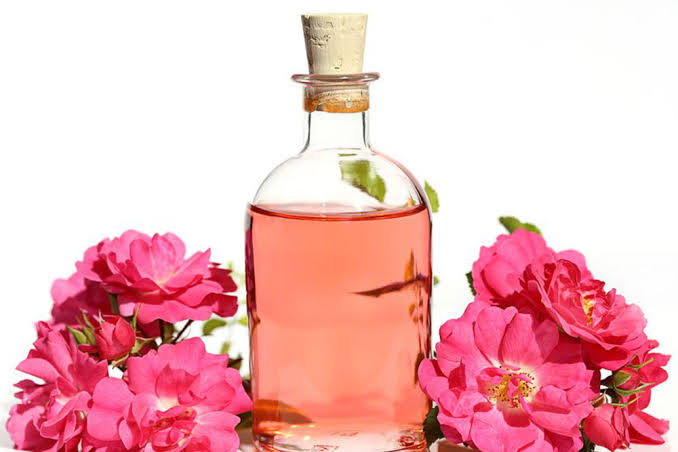Rose water is a liquid made from rose petals and water. Because of its sweet scent, it is used as a perfume but it also has medicinal and culinary values.
There is a long tradition that rose water is used in medicine as far back as the 7th century, including in Iran and other parts of the Middle East.
There is also evidence of the use of North American Indian tribes for treating ailments.
Important facts about rose water:
- Rose water can usually be used without any side effects.
- Rose water contains numerous, powerful antioxidants.
- Recent research has found that it can help relax the central nervous system.
What are the benefits?
Below we look at some of the medicinal benefits of rose water and its uses.
Skin

The skin is the body’s largest organ, which serves as a shield to UV radiation, toxins, and other physical pollutants.
In rose water the antioxidants protect the skin cells against damage.
Rose water also has anti-inflammatory properties which means the irritation caused by conditions such as eczema and rosacea can be soothed on the skin.
Rose water acts as an inhibitor against elastase and collagenase, both of which are skin-damaging.
This, in turn , can help soothe the skin and reduce redness and, by reducing the appearance of lines and wrinkles, also act as an anti-aging product.
Respiratory
Rose water can be taken to treat a sore throat, due to its soothing and anti-inflammatory effect. A study has also shown that it can act as a relaxant on the throat muscles.
Eyes
Rose water can be used in its liquid form as part of an eye drop and has been shown to have excellent benefits for people with eye problems.
Conditions it can help treat include:
- conjunctivitis
- conjunctival xerosis or dry eye
- acute dacryocystitis
- degenerative conditions, such as pterygium or pinguecula
- cataracts
Wounds
Rose water has antiseptic and antibacterial properties which means that by keeping them clean and fighting injections it can help wounds heal faster.
The rose water wound forms can be used on include:
Infections
Due of its antiseptic properties and the fact that rose water can stimulate the immune system to produce histamines, it has proven to be effective in preventing and treating infections.
Brain

Rose water vapor inhalation has traditionally been used as a means to enhance a person’s mood. They can also take the liquid orally.
Work has shown that rose water has properties such as antidepressants and anti-anxiety. A hypnotic effect close to that of the prescription drug diazepam is believed to cause sleep and.
It has been used to treat a number of mental health , including:
- depression
- grief
- stress
- tension
In other medical cases it is understood that rose water is helpful in treating conditions such as dementia and Alzheimer’s disease.
It has been shown that a particular protein fragment called an amyloid created by the body is present in these conditions and affects the function of the brain, destroys cells and impedes memory. Encouragingly, this amyloid is an inhibitor of properties found in rose water.
Headaches
Just as rose water fumes are inhaled to help improve mood, the de-stressing effects are also believed to be able to help treat headaches and migraines.
Rose water has been used in aromatherapy for some time, and for similar effects may also be applied to a cloth and placed on the forehead.
Digestion
Rose water consumption has also shown to have beneficial effects on the digestive system. This functions by rising the bile flow, helping with symptoms of common complaints, including bloating and stomach upset.
Rose-water intake can also act as a laxative. It can increase both the amount of water in the feces and the frequency of going to the toilet, making it a good constipation treatment for you.
What forms and types are there?

Rose water contains ten to fifty percent rose oil. It is often used both at religious ceremonies and in the food industry. The same product may, however, come in various forms.
Rose oil
This is created through distillation of the rose flower. In factories, the oil can be mass-produced and is a pale, yellow and semisolid colour.
Rose oil is known to be a fairly expensive product, due to its high concentration.
Dry flowers
Both the buds and the rose petals may be dried and used for various reasons.
The petals are often eaten, for example with yogurt, and are used for the digestive benefits mentioned earlier.
Other products
Other forms which may come in rose products may include:
- Rose hips: The seedpods of the roses, which are used either fresh or dried, and as they are or processed in factories.
- Hydrosol and absolute extract: This can be taken from the flower, petals, or hips and can be a cheaper alternative to rose oil.
- Ethanolic, aqueous, and chloroform extracts: These can be taken from the flower, petals, or hips and are used for research purposes.
Side effects
A person can topically apply rose products by putting a small amount — about the size of a dime — as an initial test on their arm. If no adverse or allergic reaction occurs within 24 hours, then it can be applied safely elsewhere.
In some cases, because of a particular and often unknown sensitivity to the product, a person can have a reaction to rose water.
This can include:
- burning
- stinging
- redness
- irritation
If anyone experiences any of these symptoms after using rose water, they should immediately notify a doctor, as this could be a sign of an infection or an allergic reaction.If someone experiences any of these effects after the use of rose water, they should tell a doctor immediately, as it may be a sign of an infection or allergic reaction.





